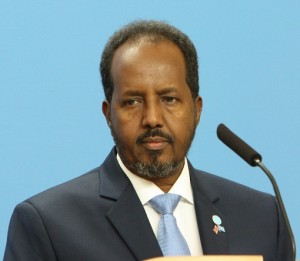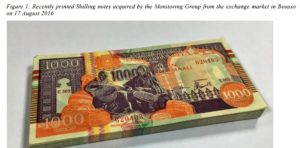Summary
Vision 2016 established three widely accepted benchmarks for a successful political transition envisaged for Somalia as at September 2016: “one person, one vote” national elections, the completion of the federal state formation process and the adoption of a new constitution. At the time of writing, the format of the elections had been altered and the timing postponed; the federal state formation process had yet to incorporate the Hiran and Middle Shabelle regional state and resolve the status of the Banadir region; and the negotiation of a new constitution had been put on hold owing to more immediate electoral imperatives. Meanwhile, the international community and the Federal Government have prioritized keeping the electoral process on track and taken pains to emphasize incremental progress, even as the goalposts for what constitutes success have shifted. In contrast, the investigations of the Monitoring Group on Somalia and Eritrea reveal an incomplete, fragmented transition process with adverse implications for peace and security, security sector reform, arms embargo implementation, humanitarian and human right issues, conflict financing and natural resource governance, and corruption.
Harakat al-Shabaab al-Mujaahidiin (Al-Shabaab) remains the most immediate threat to peace and security in Somalia. Contrary to prevailing narratives of successful counter-insurgency and counter-terrorism efforts, the Monitoring Group assesses that the security situation has not improved in Somalia during the current mandate. Al-Shabaab has retained the operational capacity to launch large -scale attacks against African Union Mission in Somalia (AMISOM) contingents, such as the offensive on 15 January 2016 against a Kenyan military company stationed at a forward operating base in El Adde, Gedo region. Al-Shabaab has also continued to launch complex attacks in Mogadishu; six attacks against hotels during the current mandate claimed a combined total of some 120 lives, including three parliamentarians and the Minister of Environment. A new rival faction of Al-Shabaab with about two dozen members has also emerged in the Golis mountains of Puntland, led by Sheikh Abdulqader Mu’min, and has pledged allegiance to Islamic State in Iraq and the Levant. In an apparent attempt to eliminate that faction, Al-Shabaab launched a failed amphibious incursion into Puntland on 13 March 2016, resulting in more than 300 members being killed in clashes with Puntland and Galmudug Interim Administration forces. Lastly, although Al-Shabaab has not successfully launched a major terrorist attack outside Somalia since the massacre at Garissa University College in Kenya on 2 April 2015, the Monitoring Group assesses that it retains both the capability to carry out another such attack and a self-proclaimed motive with regard to targeting countries contributing troops to AMISOM.
Although the Federal Government has committed itself to undertaking substantive security sector reform, continuing problems of corruption, mismanagement and financial constraints have compromised the effectiveness of the Somali National Army. The efforts to address the issue notwithstanding, the process of identifying and registering troops, including the elimination of so-called “ghost soldiers” on the payroll, remains incomplete. Investigations by the Monitoring Group S/2016/919 4/247 16-16743 have also revealed significant inconsistencies in accounting for the payment of salaries. The continuing lack of regular salary payments has contributed to an increase in withdrawals from strategic positions throughout southern and central Somalia and the subsequent, albeit temporary in some instances, return of Al-Shabaab. The Group’s investigations have also revealed the likely misappropriation of rations and supplies intended for soldiers through a contract between the Federal Government and a private company. Support provided to the military by Member States has also likely been subject to misappropriation, in particular when the goods have been provided in bulk and through third party contractors rather than directly to troops.
There have been several difficult challenges in implementing the arms embargo during the current mandate: a lack of compliance on the part of the Federal Government with reporting obligations, a lack of compliance by Member States when supporting Somali security sector institutions other than the Federal Government’s forces and the use of an improvised explosive device to target civil aviation. Although the Federal Government has improved some aspects of its compliance with reporting obligations regarding the partially lifted embargo, its reporting to the Security Council has been insufficient and it still lacks the institutional capacity to manage weapons and ammunition effectively. Calls by the Federal Government to fully lift the embargo are based on a false premise that the embargo constitutes an impediment to its importing of arms and ammunition; however, Member States have submitted advance notifications for more than 20,000 weapons and 13 million rounds of ammunition for the Federal Government’s forces since the partial lifting of the embargo in March 2013. Meanwhile, Member States have also increased their military support for regional forces that are not part of the Federal Government, but have persistently failed to comply with notification requirements, thus allowing weapons and ammunition transfers to those entities to flow de facto unchecked. This has undermined the embargo as a whole and reinforced trends towards an increasingly fragmented approach to the security sector. There has been an upsurge in maritime interdictions of illicit arms during the current mandate, with three seizures by the Combined Maritime Forces and one by a Member State. Lastly, the improvised explosive device attack on a Daallo Airlines flight from Mogadishu to Djibouti on 2 February 2016 indicates a substantial new threat to civil aviation within the region.
Annex 2.4 Somali National Army rations and supplies
In his 9 September 2015 commitment to substantive security sector reform, President Hassan Sheikh stated that “all tenders for logistic supplies will be carried out through the Interim Procurement Board”. Over a year later, the SNA continues to maintain an agreement that had been in place since at least January 2015 with Agetco General Trading and Clearance Ltd. (Agetco) for the distribution of dry food rations and ration allowances to the SNA worth between USD 1,100,000 to USD 1,200,000 per month.

Copies of the company’s bank statements confirm receipt of funds transferred from the CBS. Copies of hawala receipts confirm onward transfers of between USD 300,000 and USD 400,000 monthly, in total, by Colonel Mohamed Hussein Nur to senior commanders in Adado (Galgadud), Baidoa (Bay) Belet Weyne (Hiran), El Buur (Galgadud), El Berde (Bakool), Garbaharey (Gedo), Hudur (Bakool) and Kismayo (Lower Juba).90 Copies of hand-written payment vouchers shared with the Monitoring Group indicate transfers of between USD 400,000 and USD 500,000 in cash monthly to unit commanders in Mogadishu, Lower Shabelle and Middle Shabelle. Despite requests the Monitoring Group received no evidence of distribution of cash by commanders to their rank and file troops.
Copies of receipts shared with the Monitoring Group indicate purchase of exactly USD 350,002 worth of dry foodstuff by Agetco each month. Despite requests the Monitoring Group received no evidence to demonstrate where such large quantities of dry foodstuffs were purchased, or onward distribution of dry foodstuff to rank and file troops. Instead, anecdotal evidence collected by the Monitoring Group over the course of the mandate indicates that the only ration support many troops received is that provided by the United Nations Support Office for Somalia (UNSOS) (see below).
Registration records held by the Ministry of Commerce and Industry list Sheikh Mohamed Ahmed Roble, a.k.a. “Sheikh Saney”, as the Managing Director of Agetco. UAE-based businessman Dahir Sheikh Omar Mohammed and MP Abdulkadir Moallin Noor—the brother of J4 SNA Head of Logistics Brigadier General Abdullahi Moalim Nur—are also confirmed as having part ownership of the company. The FGS described the informal contract between the SNA and Agetco as a ‘legacy’ agreement. On 10 September 2016, following further discussions between the Group and the FGS on the matter, an invitation for tenders for the contract was finally released via the Ministry of Finance website.
Between 1 September 2015 and 30 June 2016, according to Financial Management Information System (FMIS) statements, the SNA also spent a total of USD 2,206,000 on fuel and lubricants; repairs and maintenance; office materials and other consumables; travel expenses; health and hygiene; and military materials, supplies and services. The FGS informed the Monitoring Group that the SNA provides it with no accountability for such expenditure. In the context of the arms embargo, this is of particular concern for the estimated USD 500,000 apparently spent on military materials, supplies and services. Expenditure of USD 160,000 between September and October 2015 also raises questions given that UNSOS provides fuel free of charge to the SNA.
Annex 4.1: Currency printing in Puntland

In late 2014 or early 2015, Puntland authorities are reported to have acquired a currency-printing machine, housed at the State Bank of Puntland in Bosaso, with which it has used to print counterfeit Somali Shillings. The newly printed currency has been used to for payment of salary arrears to civil servants, members of the Puntland security forces and custodial corps.
According to the Governor of the Central Bank of Somalia, Bashir Issa Ali, the last official Somali shillings were printed in 1990.While bearing the official “Muqdishu 1990” markings, the Monitoring Group has acquired a number of obviously new shilling notes all with succ essive serial numbers (see below).
In early May 2016, violent protests against soaring commodity prices—prompted by the flood of newly printed notes onto the market—broke out in both Garowe and Bosaso. The exchange rate of Somali, which has otherwise remained relatively stable in recent years, rapidly rose from approximately SOS 23,500 to USD 1, to SOS 30,000 to USD.
The President of Puntland, Abdiweli Mohamed Ali “Gaas”, has strongly denied to representatives of international financial institutions that Puntland authorities were involved in the printing of new currency. On 26 August 2016, the Monitoring Group sent official correspondence to both the President and the Minister of Finance of Puntland requesting information on the acquisition, location and use of the currency-printing machine, but is yet to receive a response. Requests to access the Bank of Puntland in Bosaso in August 2016 were refused by its Chairman, Abdi Ismail “Boos”, who has subsequently stopped acknowledging the Group’s attempts to make contact.
The total amount of new Somali Shilling currency in circulation is assumed to be relatively low. However, as demonstrated by the demonstrations in May 2016, relatively small quantities of new can still upset the market, causing inflation and commodity price rises hitting the region’s most vulnerable populations the hardest. Unregulated currency printing further threatens to undermine federal level negotiations with the International Monetary Fund (IMF) to implement currency reform in Somalia.
While the Monitoring Group recognizes the need for currency reform to formalize and stabilize the Somali economy, the unregulated currency printing in Puntland creates an opportunity for large -scale financial misappropriation, especially during the phase in which the old currency is exchanged for new genuine notes.
Read more: 2016 Report of the Monitoring Group on Somalia and Eritrea
Source: UN.org
We welcome the submission of all articles for possible publication on WardheerNews.com. WardheerNews will only consider articles sent exclusively. Please email your article today . Opinions expressed in this article are those of the author and do not necessarily reflect the views of WardheerNews.
WardheerNew’s tolerance platform is engaging with diversity of opinion, political ideology and self-expression. Tolerance is a necessary ingredient for creativity and civility.Tolerance fuels tenacity and audacity.
WardheerNews waxay tixgelin gaara siinaysaa maqaaladaha sida gaarka ah loogu soo diro ee aan lagu daabicin goobo kale. Maqaalkani wuxuu ka turjumayaa aragtida Qoraaga loomana fasiran karo tan WardheerNews.
Copyright © 2024 WardheerNews, All rights reserved


